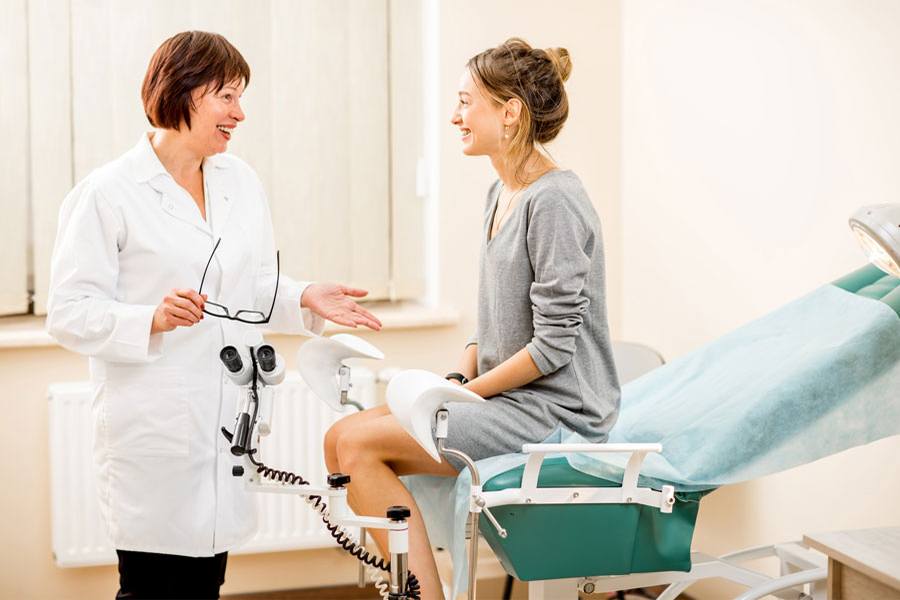Here’s When You Should Go to Your Gynecologist Outside of Your Yearly Exam

It’s common knowledge that you should see your gynecologist for your annual appointment. But let’s face it, being female can be a complicated thing which means sometimes it’s not always just a once-a-year stop. We sat down and chatted with Dr. Licette Almonte, an OB/GYN with Main Line HealthCare, to learn when you should visit your gynecologist outside of your annual appointment.
You’re Starting New Birth Control
There’s a misconception that oral birth control is the best and safest option, however, that’s not always true. For some women, it’s inconvenient and challenging for them to remember when to take the pills. Talking to your OB/GYN before starting new birth control will also help your doctor get a better sense of your history and how any medical conditions may interfere with your birth control. Keep in mind, it might take a bit of exploration to identify which method works for you, which is why Dr. Almonte says to see a doctor who will help you figure out which options are best suited to your needs.
To be Screened for a Sexually Transmitted Infection (STI)
Dr. Almonte says it’s time to get an STI screening if you are sexually active and have never been tested. “There can be a lot of apprehension around this type of appointment,” Dr. Almonte says. “Many patients are afraid of being judged or fear an abnormal result, but doctors encourage and applaud patients who get STI testing, in fact, it should be as normal as getting your blood pressure tested.”
It’s always better to be on the safe side as the consequences of an untreated STI could mean infertility or a recurring infection. The earlier an STI is caught, the healthier patients will be, or if the test results are negative you can rest assured knowing there is nothing to worry about.
Before You Get Pregnant
If you’re trying to conceive it’s a good idea to consult your OB/GYN. Dr. Almonte says that while most women are healthy, it’s worth making an appointment in case there are signs that your pregnancy may be more complicated than others. This is also a good time to double check that you aren’t at risk for high blood pressure, diabetes or other medical issues which can affect you or your baby during your pregnancy. At this appointment, you can also ask questions about getting pregnant like when should you stop taking birth control or which time of the month is best to get pregnant.
When You’re Pregnant
It’s important to establish a relationship with your OB/GYN as early on in the pregnancy as possible. “The earlier in your pregnancy that you make that first visit, the more opportunity there is to provide better care,” Dr. Almonte says. At this appointment, your doctor will determine your approximate due date and let you know what to expect. This is also a good opportunity to bring a list of questions that you and your partner have about your pregnancy, prenatal care and birth options.
You’re Experiencing Heavy or Painful Periods
Everyone experiences their period differently. If your period tends to be heavier than average, there may be nothing wrong, but you may still want to talk to your doctor if you have concerns. In some cases, a heavy, painful or irregular flow can point to an underlying condition. Heavy or painful periods can signal endometriosis, uterine fibroids, polycystic ovary syndrome (PCOS), or other conditions.
You’re Having Trouble Getting Pregnant
If you’ve been trying to get pregnant for a year – or more than six months if you are over 35 – you should see your gynecologist about being examined for fertility issues. “Any women with any concern about their fertility should come on in,” Dr. Almonte says. During this appointment, we will discuss the variety of diagnostic tests and treatment options offered by Main Line HealthCare to help you and your partner.
You’re Experiencing Symptoms of Menopause
The average age to begin menopause is about 51 but symptoms can begin in your 40s. If you’re experiencing irregular bleeding, frequent cycles, mood changes, depression, anxiety, hot flashes or painful intercourse – all of those are normal menopausal symptoms, signaling that it may be time to see your doctor.
You’ve Noticed Changes in Discharge, Breasts, Menstruation or Your Skin
You should see your doctor right away if you notice any lumps, pain or discharge from your breasts. If you notice skin changes on your breasts or vaginal area it could be a sign of a serious problem. It may be nothing but it could be caused by an infection, irritation or it may be a precancerous symptom so see your doctor to know for sure and get proper treatment.
If You’ve Never Been to the Gynecologist
Even if you’ve never experienced issues if you are age 21 and older and have never been to a gynecologist you should make an appointment. If you are younger than 21 and experience pelvic pain, are sexually active, have any breast issues or discharge, you should also see an OB/GYN.
For more information about women’s reproductive health, visit Main Line Health here.
This is a paid partnership between Main Line Health and Philadelphia Magazine



